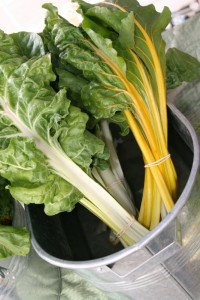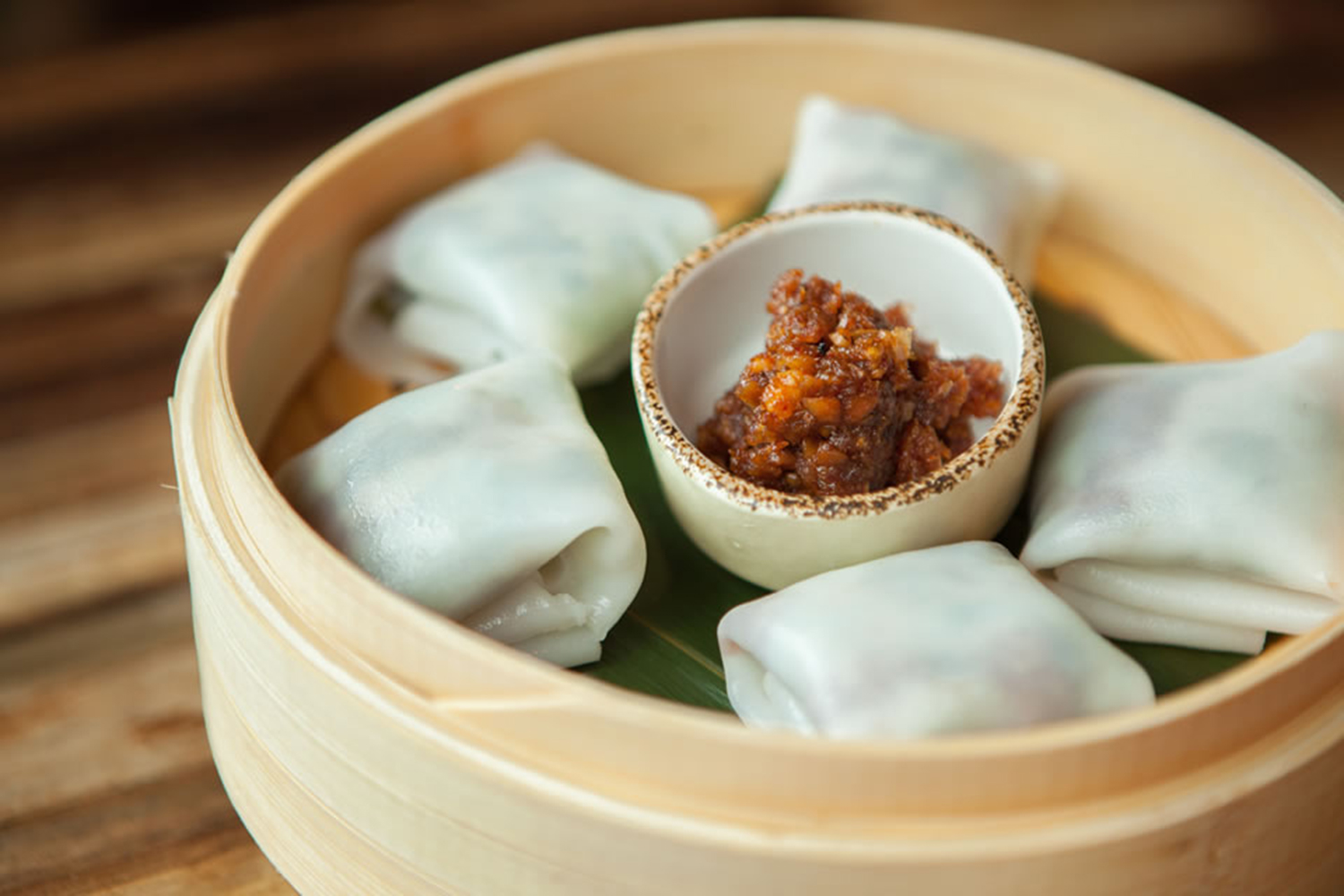Cuisine served straight from local valley farms captures the summer’s freshest flavors.
By Amiee White Beazley
To many Aspen visitors, it may appear that the summer season, and hence the growing season, is a short one. And they are right—Aspen’s warm months extend only from May to September, if Mother Nature cooperates. But that doesn’t stop Aspen’s top chefs from fully utilizing the abundance of fresh food grown by area farmers during that time.
Developing relationships with regional growers, knowing which fruits and vegetables are in season and how to showcase them in distinctive dishes is the defining standard by which all great chefs operate in Aspen. Many frequent the local farmers markets to find the best of summer’s bounty, and then shape their recipes around these standout ingredients, delighting diners by creating culinary masterpieces that are bursting with flavor.
Locally Grown
For David Viviano, executive chef at The St. Regis Aspen Resort, uncovering the best local food sources is one of his main objectives.
“When I buy from my local farmer, I know I’m getting the freshest possible ingredients,” he says. “I’m spurring my local economy and becoming part of the community by buying locally, and then turning it into a wonderful meal for our guests. I can highlight what the Roaring Fork Valley can offer and, by doing so, provide the guest with an experience they can’t get anywhere else.”
Viviano is also keenly aware of the vibrant taste of local foods and how they translate onto guests’ plates. “Not only is it great to highlight local produce, but I’m getting it from the farmers at the peak of the season,” Viviano says. “The flavor is going to be far and away better than anywhere else I could get it—300 or 400 miles away. As a chef, there is such a perfect simplicity to local products. For example, the taste of summer heirloom tomatoes. With a product so fresh, it is wonderful with just sea salt and olive oil. It can be simple. You don’t have to manipulate it. Just keep it at its most raw form.”
Produce grown by local farmers also is key to chef Martin Oswald’s healthy cuisine at Pyramid Bistro in Explore Booksellers on Aspen’s Main Street. Here, Oswald serves nutrient-dense dishes, based on the freshest ingredients he can access.
“Local foods are very important to eat because they have the best phytonutrient mix we need to consume in that region to get us the maximum health benefits,” he explains. “Even more important for your health is how we prepare these foods.”
Oswald’s culinary education began at a young age, growing up in the lush Austrian country village of Löffelbach, where his family’s yard yielded an enormous variety of fruits and vegetables.

“As kids, we spent our summers picking black, red and white currants,” he says. “Bing cherries and sour cherries were devoured right off of our trees, and my mother would preserve whatever was left. Plums, peaches and raspberries were made into jams.
“My favorite time of year was when my dad would take me and my siblings on our neighbor’s tractor with a load full of fresh apples. We would travel to the local apple press some 3 miles away, where we made a fantastic hard cider, apple vinegar and sweet apple juice. The summer was also spent hunting for mushrooms—chanterelles, porcinis, parasols, slippery Jacks and many other varieties. All this produce was not only consumed by us, but we had enough to happily barter with our neighbors for honey, wine or other items.”
This way of life has translated to his career at Pyramid Bistro, where Oswald creates dishes to fit vegetarian, vegan, macrobiotic, raw and gluten-free diets. Even the wines served are biodynamic, organic and sustainably produced.
“When I was only 15 years old, I started an apprenticeship as a cook. To my great astonishment, I learned that [the chef] cooked the way my mother has always practiced since I was a little boy—organically grown food. It has always been my passion to continue to cook as I have experienced it growing up, with fresh, local and, therefore, delicious products.”
Perfect Pickings
Expect to find ingredients such as bok choy, lollo rosso lettuce, watermelon, radish, Swiss chard and varieties of kale, corn and peppers on Oswald’s summer and early fall menus at Pyramid Bistro. Oswald works with farms such as Rain Crow, Thistle Whistle, Rendezvous, Hillside Acres and Orchard Valley, and looks to super-sourcer Jack Reed to provide produce.
Reed, who also plans to grow his own fruits and vegetables at Dogpatch Farm this year, often sets up a small farmers market outside of Peach’s Corner Café, where he sells eggs and produce like salad greens and spinach. Some of that produce makes its way into dishes at the cafe where co-owner and chef David Roth sources as much as possible from local growers. “The way we see it, ‘local’ is not about being cliche,” Roth says. “At the end of the day, that’s what tastes the best, and we work really hard at getting the ingredients.”
Underneath the cafe’s signature orange umbrellas, locals can often be found enjoying delicious, organic menu items such as kale salad and the signature open-face sandwich with poached local eggs on flatbread, peach butter, heirloom tomatoes and fresh arugula, as well as daily specials such as the yakisoba noodle bowl with shiitake mushrooms.

While a wide range of produce is available in this fertile valley, the region also is home to local creameries such as Avalanche Cheese Co. in Basalt, Colo., as well as Fruition Farms and Haystack Mountain Goat Dairy in the Front Range area—all favorites of Viviano at the St. Regis. Avalanche and Haystack offer handcrafted creamy goat cheese while Fruition is Colorado’s first artisanal sheep dairy and creamery.
A strong supporter of local creameries, farmers and ranchers, Viviano has begun a new program this July through September. Once a month, a group of St. Regis guests will be invited to accompany Viviano to the Aspen Saturday Market to learn about food from area growers and then select produce to bring back and watch as he uses those ingredients to prepare a three-course luncheon for the group.
Expect local ingredients such as asparagus, carrots, peas, beets and cherries to appear in his dishes in early summer, while, later in the season, fruits and vegetables such as corn, squash and peaches translate directly into St. Regis sandwiches, pastas, pizzas and desserts.
“It’s a constant work in progress,” Viviano says of local sourcing. “The menu is always evolving, as we find things at peak of the season. I never get complacent. I’m constantly looking at what’s new to see what’s out in the community and highlight what the valley has to offer.”
Farm to Menu
While locally grown food can be found gracing the menus of many Aspen restaurants, a special event called Eat Drink Local Week showcases the area’s bounty in August, organized by Edible Aspen magazine.
“Back in 2007, words like ‘locavore,’ ‘grassfed’ and ‘heritage breed’ were not ingrained in our vocabulary,” says Lisa Houston, Edible Aspen publisher. “Farm-to-table dinners were not mainstream; agri-tourism was barely even an option for a day’s outing, let alone a vacation destination; and not many restaurants sourced locally. If they did, identifying the sources on their menus was not common practice.”
Things have definitely changed, and for the better—so much so that Aspen not only has embraced the local food movement, it is now poised to celebrate Eat Drink Local Week with special events and more than 40 participating restaurants offering menu items identifying local food sources.

“A significant portion of these local businesses are food-related: farmers, ranchers, food artisans, beer, wine and spirit producers, markets and restaurants,” she says. “They make up an important part of our community and many go to great lengths to provide high-quality, healthy, honest, fair food for us—whether they’re producing it, selling it or serving it up—[and] they deserve recognition and support.”
Eat Drink Local Week decals will be displayed at participating restaurants throughout Aspen. For this week, each of the restaurants will have a special dish prepared utilizing local ingredients. Houston hopes that locals and visitors will gain a new appreciation for Aspen’s restaurants already working with farmers and food artisans, and that they encourage restaurants trying it out, perhaps for the first time, to continue to work with local producers.
“Colorado-produced meat, dairy, baked and canned goods and beverages are abundant and available year-round,” she says. “I think a lot of consumers are used to, and expect, restaurants to serve fresh produce, whether it’s in season or not. Eating seasonally is the way nature intended [and] it would be nice to see more emphasis placed here.”
Whether sampling the Aspen-area’s farm-fresh produce during Eat Drink Local Week or any other time, it becomes clear that the Roaring Fork Valley offers a flavorful palate for Aspen’s chefs to create their culinary works of art.








